|
|
|
Sort Order |
|
|
|
Items / Page
|
|
|
|
|
|
|
| Srl | Item |
| 1 |
ID:
084052
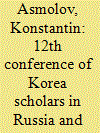

|
|
|
|
|
| Publication |
2008.
|
| Summary/Abstract |
On March 27 - 28 the 12th annual academic conference of Korea scholars in Russia and the CIS countries was held at the Institute for Far Eastern Studies of the Russian Academy of Sciences. The main subject discussed was "Korea on the Threshold of Changes.
|
|
|
|
|
|
|
|
|
|
|
|
|
|
|
|
| 2 |
ID:
153486
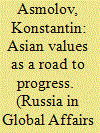

|
|
|
|
|
| Summary/Abstract |
The modern world's structure is not only explicitly pyramidal, but it is also very rigid. Only a few Second or Third world countries could make it into the First World after they had speedily modernized themselves. By accident or coincidence, all such countries happen to be in the Confucian cultural region. The most obvious example is the Republic of Korea, which in the early 1960s was behind Nigeria in terms of development but which by the beginning of the current economic crisis aspired to be among the top ten most developed countries. Singapore and Taiwan showed impressive economic growth rates, and now Vietnam and the Peoples Republic of China are following suit.
|
|
|
|
|
|
|
|
|
|
|
|
|
|
|
|
| 3 |
ID:
183445
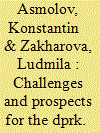

|
|
|
|
|
| Summary/Abstract |
Since the 1990s, many publications in the world have predicted the "imminent collapse of the North Korean regime" or a change of power in the country. However, so far this has not happened, and the DPRK continues to exist in its former form. What leads to such chronically unrealizable predictions about North Korea, and what are the alternatives for the future of this country in the short and medium term?
Based on a number of recent unfulfilled predictions, the authors try to explain the reason for these failures, closely related to ideological framework, lack of information, and dependence on certain sources, which leads to underestimation of the DPRK's capabilities and misinterpretation of data, when any event is seen as a sign of the regime's imminent collapse. Based on the theoretical approaches of Gordon Tullock and Vladimir Lenin, the article identifies the main types of modern threats to the current political regime (external invasion, coup within the elite, economic collapse, mass protests), as well as the probability of their implementation under the current policy of the DPRK leadership.
|
|
|
|
|
|
|
|
|
|
|
|
|
|
|
|
| 4 |
ID:
157247
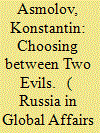

|
|
|
|
|
| Summary/Abstract |
On September 3, 2017, North Korea conducted its sixth nuclear test, that of a hydrogen bomb, which can be mounted on an intercontinental ballistic missile. Pyongyang's statements that it has completed the development of nuclear weapons have put an end to a period of uncertainty, when the great powers thought that the North Korean nuclear issue could simply be wished away.
|
|
|
|
|
|
|
|
|
|
|
|
|
|
|
|
| 5 |
ID:
079139
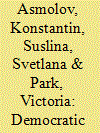

|
|
|
|
|
| Publication |
2007.
|
| Summary/Abstract |
The leader published simultaneously on the first day of 2007 in three central North Korean newspapers, Rodong Sinmun, Choson Inmingun, and Ch'ongnyon Chonwi, proclaimed the year just past an "unprecedented period in the chronicle of the life-giving Korean revolution imbued with ideas, when the country's positions reached the heights of a majestic and mighty power, which became a demonstration of the grandeur of the Korean nation." Accordingly, the year that just began was heralded as a "year of continued fulfillment of the Great Leader's design for building a powerful Homeland, a year when the country as a whole is permeated with the spirit of fresh accomplishments."1
"Acquisition of nuclear deterrent forces" was named the main event of 2006 in North Korea. These forces, says the New Year Day article, "is a mighty factor against the double-standard approach and the policy of sanctions and strangulation on the part of the U.S., a boost to the cause of peace and security in Northeast Asia."2 According to North Korean reports, nearly 100,000 people took part in the demonstration staged in support of the nuclear tests conducted on October 20, 2006.3
The year 2006 changed little in the domestic situation, which remained stable. The government machinery hummed along, mainly for "protocol". New monuments continued to be put up, as usual, to celebrate an anniversary or mark a visit by Kim Il Sung or Kim Jong Il to a site. Gala meetings were held or national rallies called, which were, as a rule, addressed by government representatives. On January 26, for example, a national convention of public service, party, and nongovernmental organizations was treated to a speech by Yang Hyong Sop, Vice Chairman of the Presidium of the Supreme People's Assembly (SPA). A convention of activists of the Union of Agricultural Workers was hold
|
|
|
|
|
|
|
|
|
|
|
|
|
|
|
|
| 6 |
ID:
085729
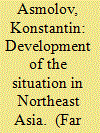

|
|
|
|
|
| Publication |
2008.
|
| Summary/Abstract |
Economic zones centered on seaports have a rich history that goes back to the mid -16th century when the first-ever free port came into being. Free trade regime operated in different period through the middle Ages in Genoa, Venice, Hamburg and Bremen. The chief causes that brought them to life were the high customs duties cities. Free trade regime was frequently instituted as new ports were built in order to attract cargo traffic and invigorate trade.
|
|
|
|
|
|
|
|
|
|
|
|
|
|
|
|
| 7 |
ID:
158196
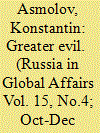

|
|
|
|
|
| Summary/Abstract |
The Korean Peninsula crisis is steadily moving towards a potential explosion. The war of words between Washington and Pyongyang is less and less reminiscent of a sandbox scuffle between kids and is threatening to escalate into an armed conflict. What should Moscow do in this case?
|
|
|
|
|
|
|
|
|
|
|
|
|
|
|
|
| 8 |
ID:
175936
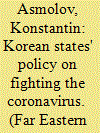

|
|
|
|
|
| Summary/Abstract |
Against the background of a protracted and arduous war on the coronavirus pandemic, the experience of countries that were able either to keep the virus out or to handle the problem with relatively few cases and deaths draws attention. In this context, both the DPRK and RoK are interesting examples, whose experiences, including comparative ones, are worth a more careful look. In both countries, the control of coronavirus has proven to be a political issue, and therefore these states have invested as much as possible in solving the problem, using all means of control according to the available technological level.
|
|
|
|
|
|
|
|
|
|
|
|
|
|
|
|
| 9 |
ID:
087646
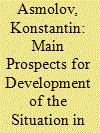

|
|
|
|
|
| Publication |
2009.
|
| Summary/Abstract |
Considering the possible escalation of the confrontation between the United States and an increasingly powerful China, the Korean Peninsula is of extraordinary importance to the Americans as a staging area, and demonized North Korea provides good grounds for an American military and political presence in the region. Recently, however, the lack of a unified US strategy on the North Korean issue has been apparent. This discord stems from the existence of several interest groups, each with its own point of view, in the United States.
To begin with these differences exist between those who, in the words of A. V. Vorontsov, may provisionally be called "pragmatists" and "messianics." The first group, as is clear from its sobriquet, favors a pragmatic approach to resolving the North Korean issue, and it believes that a rapid settlement on American terms would lower the level of possible tension, put an end to the "nuclear domino" trend so undesirable to Washington, and generally aid the growth of US prestige as an objective power capable of being an honest guarantor of international security
|
|
|
|
|
|
|
|
|
|
|
|
|
|
|
|
| 10 |
ID:
099582
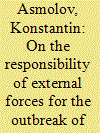

|
|
|
|
|
| Publication |
2010.
|
| Summary/Abstract |
The author attempts to determine who actually bears responsibility for the outbreak of the Korean War. He compares and contrasts different ideas on this topic and the propaganda clichés used in them. The author himself views the Korean War as a civil war, provoked by the division of the country and exacerbated by foreign interference. While stressing the importance of internal factors in determining the reasons for the war, he notes the special role of Pak Hong-Yong as one of the main supporters of launching this military conflict.
|
|
|
|
|
|
|
|
|
|
|
|
|
|
|
|
| 11 |
ID:
167733
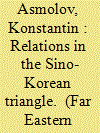

|
|
|
|
|
| Summary/Abstract |
This article discusses the PRC policy in relation to the DPRK and the RK in 2018. Analyzing the Sino-North Korean relations, demonstrating a high level of contacts in both political and economic spheres, the author concludes that in case of further intensification of the confrontation between Beijing and Washington, China will reduce interaction with the RK and US.A. on the issues of denuclearization and weaken the sanctions pressure on the DPRK which, in turn, due to the conditional "rapprochement" with the United States will seek to ensure its freedom of maneuver. As for the relations between the PRC and the RK, according to the author, there is no serious progress in resolving the current problems yet.
|
|
|
|
|
|
|
|
|
|
|
|
|
|
|
|
| 12 |
ID:
075348
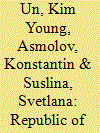

|
|
|
| 13 |
ID:
157663
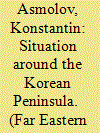

|
|
|
|
|
| Summary/Abstract |
Another North Korean nuclear test and the launching of intercontinental ballistic missiles have marked an end of the period of ambiguity, when great powers could think that the nuclear problem of the Korean Peninsula would be resolved as a matter of course. In the existing situation North Korea, the U.S.A., the PRC, Russia, South Korea, and Japan are faced with a difficult choice. The article analyzes the reasons and consequences of this choice and factors capable to influence it.
|
|
|
|
|
|
|
|
|
|
|
|
|
|
|
|
|
|
|
|
|